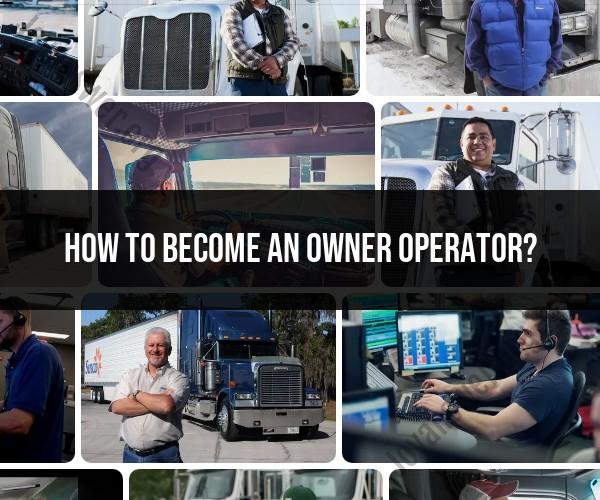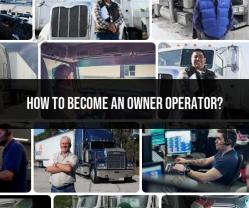How to become an owner operator?
Becoming an owner-operator in the trucking industry involves several steps, from gaining the necessary experience as a commercial truck driver to making key business decisions. Here's a comprehensive guide on how to become an owner-operator:
Obtain a Commercial Driver's License (CDL):
- Start by obtaining a CDL by attending a CDL training program or truck driving school. This typically involves both classroom instruction and practical training. Pass the written and skills tests to obtain your CDL.
Gain Experience as a Company Driver:
- Before transitioning to an owner-operator, gain experience as a company driver. This helps you understand the industry, build your driving skills, and potentially establish relationships with carriers.
Build a Clean Driving Record:
- Maintain a clean driving record. A good driving history enhances your credibility when seeking financing and negotiating with carriers or shippers.
Save Money:
- Save money for your transition to owner-operators. You'll need funds for a down payment on a truck, insurance, maintenance costs, and other business-related expenses.
Research and Choose a Truck:
- Research different types of trucks, considering factors like fuel efficiency, maintenance costs, and the type of hauling you plan to do. Decide whether you want to buy a new or used truck.
Secure Financing:
- Explore financing options to purchase your truck. Some owner-operators use personal savings, while others secure loans or financing through truck dealerships or financial institutions.
Get Your Truck Insured:
- Obtain commercial truck insurance for your vehicle. Insurance is a legal requirement and a crucial aspect of protecting your investment and managing potential risks.
Register Your Business:
- Register your business as a sole proprietorship, partnership, LLC, or another suitable legal structure. This step is essential for tax purposes and legal compliance.
Obtain Operating Authority (MC Number):
- Depending on your location and the type of hauling you plan to do, you may need to obtain an Operating Authority (MC number) from the Federal Motor Carrier Safety Administration (FMCSA). This step is necessary if you plan to transport goods across state lines.
Fuel and Maintenance Accounts:
- Set up fuel and maintenance accounts with reputable vendors. This can include establishing relationships with truck stops and maintenance providers.
Find Freight and Establish Contracts:
- Decide whether you want to work with a carrier, use load boards, or establish direct contracts with shippers. Building relationships with freight providers is crucial for maintaining a steady flow of work.
Stay Compliant with Regulations:
- Understand and comply with industry regulations, including hours-of-service rules, safety regulations, and licensing requirements. Compliance is essential for avoiding fines and ensuring the safety of your operation.
Invest in Technology:
- Consider investing in technology such as GPS, electronic logging devices (ELDs), and other tools that can help with navigation, logistics, and compliance.
Manage Finances and Budgeting:
- Develop a solid financial plan for your owner-operator business. This includes budgeting for operating costs, managing cash flow, and keeping accurate financial records.
Market Yourself:
- Develop a professional image for your business. This includes creating a logo, business cards, and a website. Marketing yourself as a reliable and professional owner-operator can help attract more business.
Join Industry Associations:
- Consider joining industry associations and networking groups. This can provide you with valuable insights, support, and opportunities to connect with other owner-operators.
Becoming an owner-operator is a significant entrepreneurial pursuit that requires careful planning and a solid understanding of the trucking industry. Seek advice from experienced owner-operators, stay informed about industry trends, and continuously work on building and managing your own successful trucking business.
What steps are involved in becoming an owner-operator?
Becoming an owner-operator trucker requires careful planning and preparation. Here's a breakdown of the key steps involved:
Pre-Launch:
- Get your CDL: This is the first and most crucial step. Choose the appropriate class (A for heavy-duty trucks) and obtain the necessary endorsements if you plan to specialize.
- Gain experience: Working as a company driver provides valuable on-the-job experience, safety training, and industry knowledge. This builds your driving record and helps you understand the business side of trucking.
- Develop your business skills: Take courses or workshops on accounting, marketing, and business management specific to the trucking industry.
- Secure funding: Research financing options like loans or leasing arrangements to acquire your truck. Consider the initial investment and ongoing costs like maintenance and insurance.
Launch Phase:
- Obtain permits and insurance: This includes operating authority from the FMCSA, commercial insurance for your truck and cargo, and any additional permits for your chosen type of trucking.
- Establish your business: Decide on your business structure (sole proprietorship, LLC, etc.) and register it with the appropriate authorities. Open a business bank account and credit card.
- Acquire your truck: Choose a truck that fits your budget, desired cargo type, and operational needs. Consider factors like fuel efficiency and maintenance costs.
- Develop marketing strategies and build your customer base: Network with other owner-operators, industry professionals, and potential clients. Consider joining professional organizations or attending industry events.
Post-Launch:
- Maintain compliance: Adhere to FMCSA regulations regarding truck maintenance, driver qualifications, and safety measures.
- Manage your finances: Track your income and expenses, maintain proper records, and stay informed about tax obligations.
- Continue learning and adapting: Stay updated on industry trends and regulations, invest in training, and adapt your business strategies as needed.
- Network and build relationships: This is crucial for finding new clients, securing better rates, and staying connected with the industry.
- Prioritize safety: Make safety your top priority. Invest in proper training, equipment, and maintenance to minimize risks and ensure a safe and successful career.
Additional tips:
- Seek mentorship from experienced owner-operators who can provide guidance and support.
- Understand the risks and challenges involved in running your own business.
- Be prepared for long hours, hard work, and the responsibility of managing a complex operation.
- Enjoy the freedom and independence that comes with being your own boss.
Becoming an owner-operator trucker can be a rewarding career path with significant income potential. However, it requires dedication, hard work, and strong business acumen. By following these steps, gaining experience, and building a solid foundation, you can increase your chances of success in this exciting field.
Remember, this is a general overview. Specific requirements and steps may vary depending on your location, desired trucking specialization, and individual circumstances. Do your research, seek professional guidance, and connect with experienced owner-operators for tailored advice and support on your journey.
I hope this information helps!



